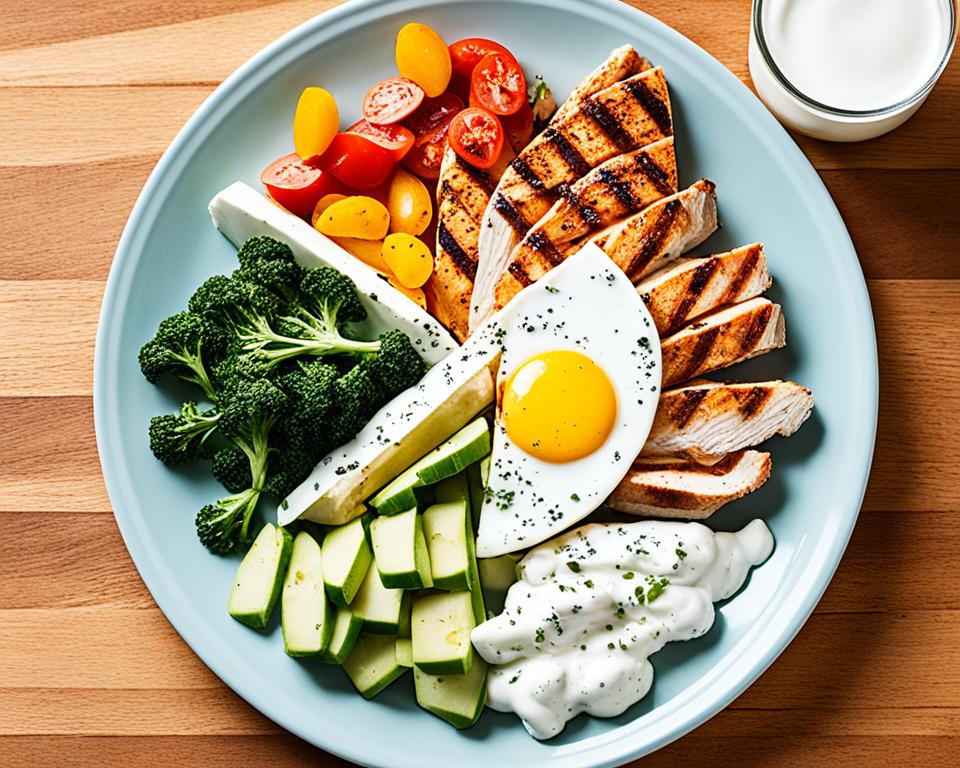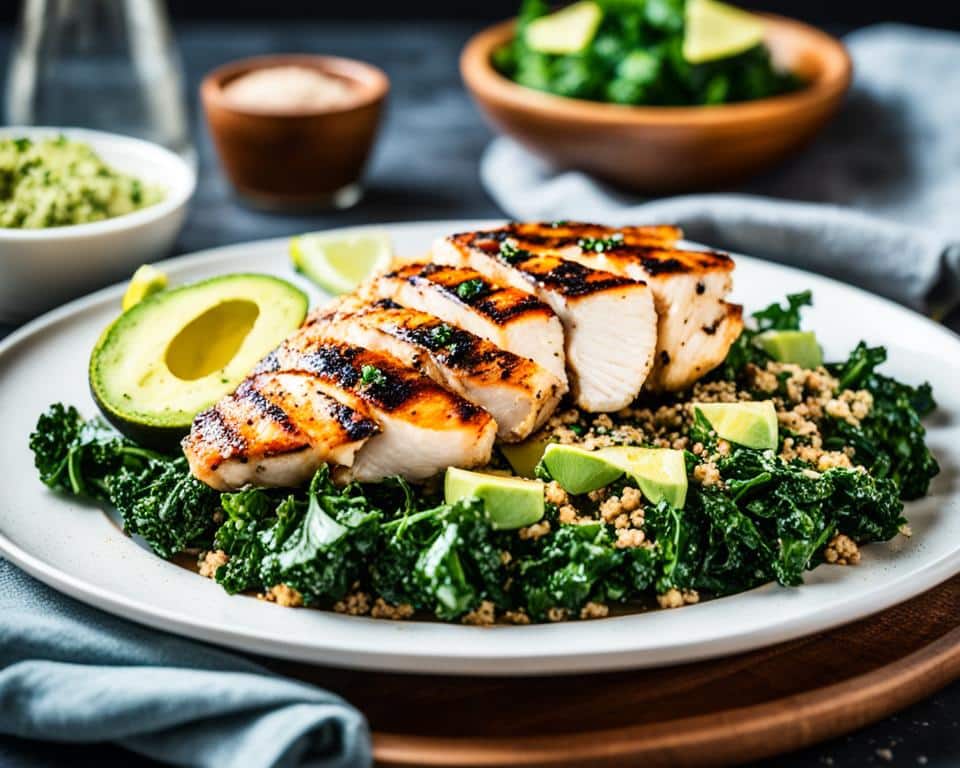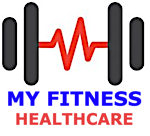Over 45% of older Americans face a hidden health issue called sarcopenia. It causes serious muscle loss, mainly in women. Yet, a high protein diet might be a beacon of hope. With many, especially women over 50, not eating enough protein, focusing on the right nutritious meals can lead to muscle gains and improved daily peak performance.
To maintain and build muscle, some may need twice the suggested minimum of 0.8 grams of protein per kilogram of body weight. I’m here to show you how to boost your diet with top-notch proteins. This ensures your workouts contribute to your strongest self.
Greek yogurt and seafood are just the start of muscle-building nutritious meals. These options are key to fighting muscle loss and boosting vitality. Stick around to discover how a high protein diet can be your partner in this journey.
Key Takeaways
- Leveraging the power of protein is critical in combating sarcopenia and promoting muscle gains.
- Understanding your personal protein needs is foundational to a successful fitness journey.
- Selecting a variety of protein sources ensures a balanced approach to maintaining peak performance.
- Implementing nutritious meals rich in protein can lead to enhanced muscle growth and overall wellness.
- Creating a structured protein diet plan aligns with lifestyle choices and maximizes muscle synthesis.
Understanding the Importance of Protein in Your Diet
I always stress the importance of protein in diet when helping someone get fit. Proteins are essential for many body functions. They help repair muscles and make enzymes and hormones. Protein also boosts wellness by fixing tissues and aiding the immune system. This shows the benefits of high protein.
The Role of Protein in Muscle Building and Repair
A good protein diet plan is vital for muscle growth. Your muscles need proper food to grow, especially after working out. Protein helps build muscle and repair fibers damaged during exercise. That’s why many athletes drink a protein shake after working out.
Daily Protein Requirements for Optimal Health
It’s important to eat enough protein every day. Women need 46 grams and men need 56 grams daily. For those who are more active, the suggestion is 0.36 grams per pound of body weight. This helps you build the muscular body you want.
Plant vs. Animal Protein: What You Need to Know
I often discuss plant versus animal proteins. Animal proteins have all essential amino acids needed for muscle repair. Plant proteins are also useful in a protein diet plan. They may have fewer amino acids but offer valuable nutrients for health.

Top Protein-Rich Foods for Muscle Gain
Let’s dive into the best foods for gaining lean muscle. Including protein-rich foods in your diet is key. The variety of muscle building foods is vast and tasty. Knowing how much protein you need—between 0.8g and 2g per kg of body weight based on your activity—is essential for top-notch nutrition.
It’s also vital to know what to eat after working out. Getting 15-25g of protein within 30 minutes post-exercise helps with muscle recovery. Foods like a medium egg or 50 pistachio nuts can provide about 6g of protein. This variety in high protein meal ideas keeps your diet exciting and helps you meet your daily protein needs. Check out some great food options for muscle growth.

For instance, leucine in pork is great for muscle repair because one-third of muscle protein is leucine. Foods like fortified tofu are rich in protein too, helping muscles recover just like animal proteins. Plus, milk and yogurt offer both casein and whey proteins along with calcium, which is important for muscles.
- Eggs are valued for being an affordable, high-quality protein source, great for any meal.
- Chicken provides all the essential amino acids, making it an excellent muscle-building protein.
- Cottage cheese has casein, a slow-digesting protein, perfect for overnight muscle recovery.
- For plant-based options, quinoa has all nine essential amino acids needed for muscle building.
Here’s how you can include these foods in your diet to understand better:
| Food Item | Protein Content | Key Benefits |
|---|---|---|
| Egg (medium size) | 6g | High-quality protein, omega-3s, versatile |
| 50 Pistachio Nuts | 6g | Healthy fats, fiber, antioxidants |
| Fortified Tofu | Varies | Complete protein, muscle recovery support |
| Pork (portion) | High in leucine | Leucine for muscle repair and growth |
| Milk & Yogurt | Packed with protein | Casein & whey proteins, ideal for recovery |
| Chicken Breast | Complete amino acid profile | Lean muscle gain, fullness feeling |
| Quinoa (cooked) | 8g per cup | All nine essential amino acids, fiber |
The high protein meal ideas provided not only support muscle growth but also ensure tasty, nutritious meals all day. To build muscle effectively, consistent, high-quality diet is crucial. With these protein rich foods, your muscle gains will be maximized.
Creating a Balanced High Protein Diet Plan
A high protein diet can boost your fitness levels, especially for muscle growth. But, knowing how to mix protein into meals is key. They should be tasty and enhance performance.
How to Calculate Your Protein Needs
Figuring out your protein needs isn’t guessing. It depends on your goals and lifestyle. Normally, 10%-15% of your daily calories should be protein. But, for bigger muscle gains, target 30%-50% from protein. Always check with a healthcare provider to tailor these figures to your needs, especially if you have health issues.
Incorporating Variety for Nutrient Balance
Eating a variety of foods is crucial for a balanced high protein diet. Include lean meats, fish, low-fat dairy, soy, and beans. Remember, a steak is tempting but has more fat than lean proteins like baked beans. A diverse diet aids muscle growth and reduces risks like calcium loss and kidney strain.
Meal Timing and Frequency for Muscle Maximization
When you eat also matters for using protein well. Instead of three big meals, eat protein throughout the day to help muscle growth. Have more protein after workouts and before bed. Always listen to your body and eat high protein foods when you’re hungry. Going for steady weight loss is better than quick, short-term gains.
“Remember, balance and moderation are key in a high protein diet. Choose your protein sources wisely, pair them with quality carbohydrates for energy, and always hydrate well to help your body process the added protein effectively.”
As your guide to muscle building, remember to focus on nutrient balance, not just protein. Aim for maximum gains with every meal!
Designing High Protein Meal Ideas for Every Lifestyle
Starting a low carb high protein diet is a unique journey in nutrition. It focuses on high protein and low carbs to help with weight loss. Many people find this diet satisfying because it helps eat less. A high protein diet plan should match your lifestyle, including choices like lean meats, fish, and legumes.
I’m here to show you high protein recipes that are easy and tasty. You can get 25-30 grams of protein per meal. Try a delicious avocado breakfast bruschetta or black bean and sweet potato quesadillas. These meals are not only for building muscle but are also healthy and diverse.
Talking to healthcare professionals is crucial when starting a high-protein diet. Despite the possible risks, finding delicious meals like apple coleslaw or grilled steak with salsa criolla makes it easy. A diet high in protein can speed up your metabolism and lower blood pressure. This leads to weight loss without missing out on great flavors.
FAQ
What is the significance of a high protein diet in my fitness journey?
A high protein diet is key for muscle gains and tissue repair. It also helps you reach peak performance. Proteins fuel muscle building and help your body recover after workouts. This makes your meals a big part of your progress.
Can you explain the role of protein in muscle building and repair?
Protein is crucial for building and repairing muscles. It provides amino acids, the building blocks of muscle. When you exercise, your muscles get small tears. Protein helps fix these, leading to muscle growth and more strength. It also helps produce hormones and enzymes for muscle health.
How much protein do I need daily for optimal health and muscle repair?
Your daily protein needs depend on what you do, your age, and your muscle repair needs. For muscle recovery and growth, you should have about 1.2 to 2.0 grams of protein per kilogram of body weight. Always adjust your protein based on your goals and health advice.
What’s the difference between plant and animal protein, and which is better?
Plant and animal proteins are mainly different in their amino acid profiles. Animal proteins have all essential amino acids, making them ‘complete.’ This is key for muscle repair and growth. Plant proteins might miss some amino acids, but can still be good for muscle building. Both can help with muscle gain when used right in your diet.
What are some top protein-rich foods that I should include for muscle gain?
To boost muscle gain, eat foods like eggs, salmon, chicken breast, and Greek yogurt. Also, lean beef and plant-based foods like soybeans, chickpeas, and quinoa are good. These foods provide quality protein and other nutrients for lean muscle gain and overall health.
How can I calculate my protein needs for a balanced high protein diet plan?
To figure out your protein needs, look at your weight, how much you move, and your muscle goals. Generally, eat 1.4–2 grams of protein per kilogram of your body weight every day. For a plan that’s just for you, talking to a dietitian or fitness pro can help.
Why is it important to incorporate a variety of protein sources in my diet?
Using different protein sources gives you many nutrients, like various amino acids, vitamins, and minerals. Mixing animal and plant-based foods in your diet can better balance your nutrients. It supports your health while fitting different eating styles and needs.
What role does meal timing and frequency play in maximizing muscle gains?
When and how often you eat is key for gaining muscle because it controls when amino acids are there for muscle building. Eating protein right after you exercise and before bed helps with muscle recovery and growth. Eating protein throughout the day keeps nutrients ready for your muscles to grow.
Can you suggest some high protein meal ideas suitable for any lifestyle?
For sure! For breakfast, try scrambled eggs with spinach or Greek yogurt with nuts. A turkey salad or tuna sandwich is great for lunch. For snacks, consider peanuts or cottage cheese. Dinner options include grilled chicken with asparagus or chickpea curry for plant-based diets. These are easy, high-protein meals for supporting muscle gain and fitting various lifestyles.

